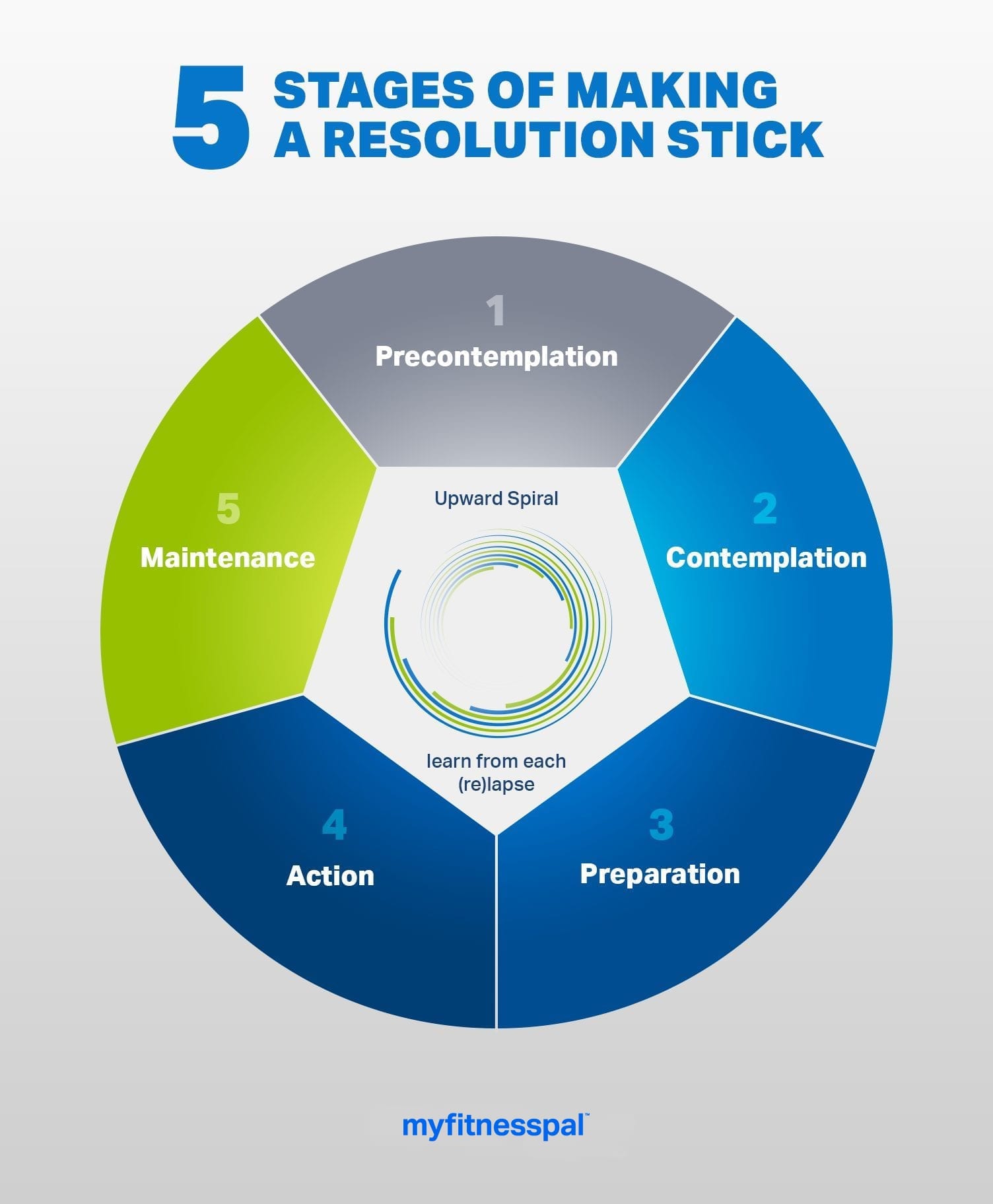If you’ve ever bailed on a New Year’s resolution, you’re not alone. Eighty percent of those resolutions fail by the second week of February. According to some research, the reason why resolutions may not stick is that you may not be mentally “ready” to make the change. This research indicates that there are five stages of change — and that your success depends on where you fall on the spectrum.
These five stages are known as the Transtheoretical Model of Health Behavior Change. The stages-of-change model isn’t meant to tell you you can’t accomplish these goals, instead, it’s a reality check that asks: Are you really ready to do this?
If you’re not ready yet, being aware of what stage you’re at will help you eventually get there.
Here’s how it works:

1. PRECONTEMPLATION
What It Means: You’re fine right where you are.
What You May Say:
- I don’t want to lose weight.
- I don’t exercise, and that won’t change.
2. CONTEMPLATION
What It Means: You might change, you might not.
What You May Say:
- I know I should lose weight, but I’m not doing anything about it.
- I don’t exercise, but maybe I should consider moving more.
3. PREPARATION
What It Means: You’re going to change — just not yet.
What You May Say:
- I’m planning to go on a diet January 1. I downloaded the MyFitnessPal app.
- I will sign up for the gym after the holidays. I bought new sneakers.
4. ACTION
What It Means: You’re changing — you have healthy new habits in place.
What You May Say:
- I’ve been eating more vegetables and less junk for the last few weeks.
- I joined a running group two months ago and exercise with them twice a week.
5. MAINTENANCE
What It Means: You changed — those habits are second nature.
What You May Say:
- I like eating salads for lunch now.
- I look forward to my runs with friends.
Before you set any resolutions, ask yourself where you are on your journey. If you’re resistant to change (in precontemplation, for example), then you might be setting yourself up to fail. To be successful, you have to start with being honest with yourself. Otherwise, nothing will change, and you might end up feeling worse about your chances at future success.
Know this: It’s normal to slip back into previous phases now and again, but the longer you stick with your healthy habits, the easier it will be to regain your motivation and momentum. A lapse is not a relapse. You can start fresh any time.
READ MORE > 10 SIMPLE, WEIGHT-LOSS HABITS MADE FOR THE OFFICE
It’s also important to remember that just because you’re motivated in one area of health and wellness, it doesn’t mean that you’ll be inspired in every area. Maybe you always get at least seven hours of sleep but struggle to find time to cook healthy meals. Or perhaps you run every weekday morning without effort but can’t seem to manage your stress. That’s normal — and the motivation you have in other areas is a proven track record of self-efficacy, and it can help bolster your self-confidence. If you did it before, you can do it again. Remember that we’re all beginners at some areas of our life.
When you’re just starting out, it can feel like those healthy habits have more cons than pros: You have to get up early, skip some happy hours for workouts, find time to shop and cook, etc. But, as these new habits become familiar and more habitual, the balance will shift, and you’ll soon see the pros of a healthier lifestyle far outweigh the perceived cons.
Now you’re ready to figure out where you are — and get ready to crush your goals in the New Year!




